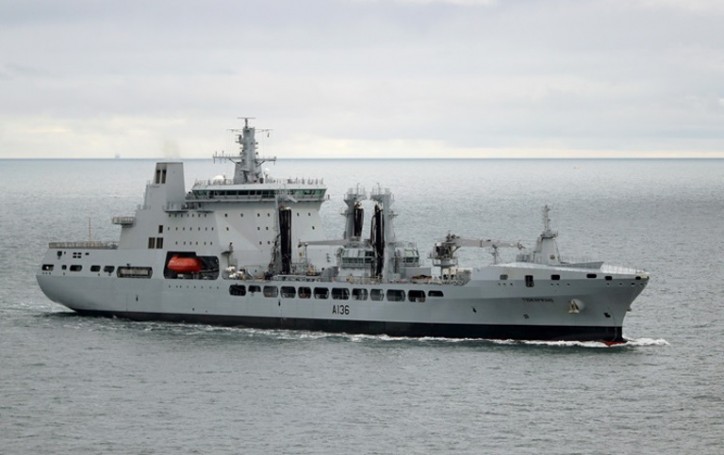- GE Delivered Its Hybrid-Electric Propulsion System to the U.K. Royal Fleet Auxiliary’s Fleet of Four Tide Class Military Afloat Reach and Sustainability Tankers
- GE’s System Allows the Fleet to Achieve Increased Fuel Efficiency and Operational Flexibility
- The Project Reinforces the Trend That More Navies are Turning to the Flexibility of Hybrid Vessels
GE’s Marine Solutions (NYSE: GE) has recently successfully delivered its electrical power and propulsion system to the U.K. Royal Fleet Auxiliary’s (RFA) fleet of four Tide class Military Afloat Reach and Sustainability (MARS) tankers, which will deliver fuel and water to Royal Navy vessels around the world.

“As the next-generation class of large, fleet tankers, the Tide class replaces old single-hulled tankers and will enhance the Royal Navy’s overall maritime capability,” said Commodore Duncan Lamb RFA, head of Afloat Support.
As part of the hybrid propulsion configuration—diesel engines coupled with electric motors—GE’s technology enables the tankers to advance at the most efficient form of propulsion for each operational scenario.
Designed for fuel efficiency, GE’s electric motor can provide power to the propellers in addition to the propulsion diesel engine, which is used when higher speeds are needed. It can also conversely harness the power from the engine shaft to generate electricity and power the electric equipment on board when the tanker operates at moderate or low speeds.
Using an electric propulsion motor powered by the ship’s generating sets to run the propeller can save fuel, reduce emissions and reduce maintenance costs of the main engines since the generating sets are running to meet other electrical needs on the vessel.
In addition to the design and engineering of the propulsion system, GE was also responsible for the commissioning of the GE-supplied equipment and training to the RFA for the switchboards and drives at its world-class Marine Power Test Facility in the U.K.
“Our power and propulsion systems for the Tide class tankers are designed for flexibility and fuel efficiency. This project is a prime example of how GE’s technology meets the navy’s stringent logistics and operational requirements,” said Andy McKeran, general manager, GE’s Marine Solutions. “GE is a trusted partner to the RFA and Royal Navy, and our collaborations span from our first power electronic hybrid electric warship with the pioneering Type 23 class that came into service in the 1990s through to the full electric solutions on the Queen Elizabeth class aircraft carriers and now the very latest in hybrid drives for the Type 26 Global Combat Ship.”
“Similar to the hybrid and electric cars, we have seen an increase in the number of the world’s navies using hybrid propulsion systems for enhanced fuel efficiency, and GE pioneered this innovation starting in the ’90s.” said Azeez Mohammed, president & CEO, GE’s Power Conversion business. “In the very near future, navy operations will also be enhanced through our digital solutions. Driven by data, navies will be able to make more informed decisions, reduce excessive maintenance and predict failure before it occurs, staying mission-ready.”
Source: GE